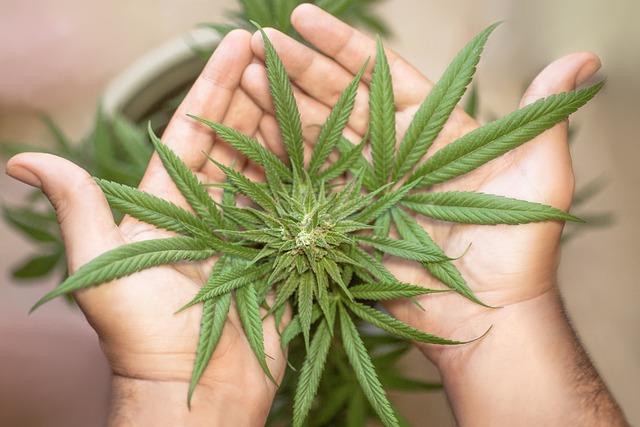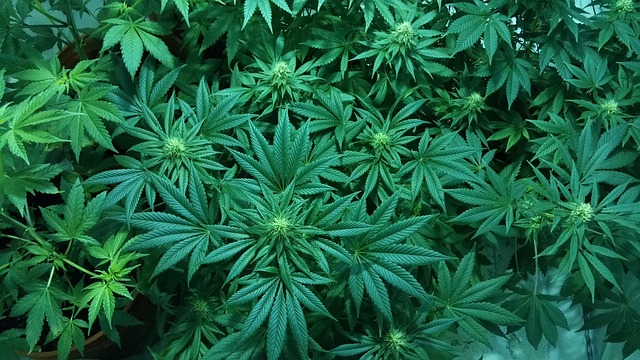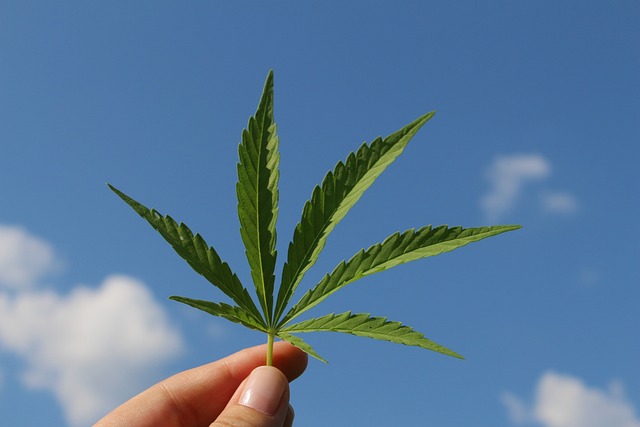2023 updates confirm that THCA (Tetrahydrocannabinolic Acid), a non-psychoactive cannabinoid, is legal in Kentucky under the conditions set by the 2018 Farm Bill and state regulations. It must contain no more than 0.3% delta-9-THC on a dry weight basis. Legal consumption requires strict adherence to regulatory compliance, including proper licensing, THC content testing, and following cultivation protocols as outlined by both federal and state laws. Consumers should procure THCA products responsibly from reliable sources to ensure they stay within legal THC limits and avoid health risks. THCA has garnered attention for its potential therapeutic benefits, including anti-inflammatory, pain-relieving, and appetite stimulating effects, without causing a psychoactive 'high.' Users are encouraged to approach these products cautiously, starting with low doses and consulting healthcare professionals. As the understanding of THCA's effects continues to develop, it remains a significant therapeutic option for those seeking cannabinoid wellness in Kentucky. Consumers must stay informed and aware of the legal distinctions between hemp-derived and marijuana-derived products, with the latter remaining federally illegal and subject to stricter state regulations. Ensuring compliance with these regulations is essential for all involved in the THCA market within the state.
Discover the nuances of THCA flower tips, a topic that intertwines the intricate legality and potential benefits within Kentucky’s evolving landscape. As we delve into the legal status of THCA in the Bluegrass State, our journey will unravel its usage, effects, and safety considerations. With a focus on “THCA legal in Kentucky,” this article provides a comprehensive guide for those interested in cultivating and consuming THCA flowers responsibly. Join us as we navigate the legal framework and explore how THCA can be integrated into a healthy lifestyle.
- Exploring THCA Flower Legality and Usage in Kentucky
- Understanding THCA Flowers: Benefits, Effects, and Safety
- Cultivating and Consuming THCA Flowers within Kentucky's Legal Framework
Exploring THCA Flower Legality and Usage in Kentucky

In recent years, the conversation surrounding cannabis derivatives has become increasingly nuanced, with THCA (Tetrahydrocannabinolic Acid) gaining attention for its potential wellness benefits. As of the current knowledge cutoff in 2023, Kentucky’s stance on THCA flower is defined by state legislation that differentiates between hemp-derived products and those containing higher levels of THC, which are associated with psychoactive effects. In Kentucky, hemp-derived products, including THCA flower, are legal provided they contain less than 0.3% delta-9-THC on a dry weight basis, as per the 2018 Farm Bill and the Kentucky Industrial Hemp Commission’s regulations. This legality is subject to compliance with both federal and state guidelines, which include licensing, testing for THC content, and adherence to cultivation practices. Users in Kentucky interested in the potential benefits of THCA must navigate this legal landscape carefully to ensure they are in compliance with the law. It’s also crucial for consumers to purchase from reputable sources to avoid products that may not meet these legal thresholds or contain harmful contaminants. As such, while interest in THCA flower is on the rise, users must stay informed about the evolving regulations surrounding cannabinoids to responsibly engage with these products within the state’s legal framework.
Understanding THCA Flowers: Benefits, Effects, and Safety

THCA, or Tetrahydrocannabinolic Acid, is a non-psychoactive cannabinoid found in the cannabis plant that is known to convert into THC, its psychoactive form, when exposed to heat or light. As interest in cannabinoids grows, THCA flowers have garnered attention for their potential therapeutic properties. In Kentucky, where certain forms of hemp-derived CBD and now THCA products are legal under the 2018 Farm Bill, enthusiasts and consumers alike explore the benefits and effects of THCA flowers. These flowers are often smoked or vaporized and are reported to provide relief from various ailments without the psychoactive ‘high’ associated with THC. Users claim that THCA flowers offer anti-inflammatory and pain-relieving effects, may aid in nausea reduction, and could potentially support appetite stimulation. It is also suggested that THCA might have neuroprotective properties due to its interaction with the body’s endocannabinoid system.
When considering the effects and benefits of THCA flowers, it is crucial to approach their use with caution. While they are legal in Kentucky under certain conditions, their effects can be potent, and individual responses may vary significantly. Safety measures should include starting with a low dosage to gauge individual sensitivity, consulting with a healthcare provider before incorporating them into one’s wellness regimen, and ensuring that the product has been sourced from reputable suppliers adhering to state and federal regulations. Users should also be aware of the legal nuances surrounding hemp-derived products in their specific jurisdiction beyond Kentucky to avoid any legal complications. With a growing body of anecdotal evidence and ongoing research into its potential, THCA flowers represent a promising avenue for those interested in the therapeutic aspects of cannabinoids, particularly in regions like Kentucky where such products are legally available.
Cultivating and Consuming THCA Flowers within Kentucky's Legal Framework

In Kentucky, the cultivation and consumption of THCA flowers are governed by a set of laws that have evolved with the changing landscape of cannabis legality in the United States. As of the knowledge cutoff in 2023, Kentucky’s legal framework allows for the cultivation of hemp, which includes THCA-rich plants, under strict regulatory guidelines as per the 2018 Farm Bill and state-specific regulations. The Kentucky Department of Agriculture oversees hemp farming, ensuring that all operations comply with the THC concentration limits set by both federal and state laws. It is crucial for farmers interested in growing THCA flowers to adhere strictly to these regulations, as non-compliance can lead to legal consequences.
For consumers seeking THCA flowers, Kentucky’s market offers a selection of hemp-derived products that are compliant with the state’s laws. These products may contain THCA but must have less than 0.3% delta-9-THC to be considered hemp and legally sold within the state. Consumers interested in the potential benefits of THCA should source their products from reputable vendors who provide transparent lab results confirming the THCA content and the absence of intoxicating levels of THC. It’s important for users to understand the differences between hemp-derived products and those derived from marijuana, which remains illegal under federal law and strictly regulated under Kentucky state law. Navigating the legal landscape for THCA consumption requires careful consideration and adherence to both federal and state regulations to ensure compliance and safety.
Kentucky’s stance on THCA flower has evolved, with clear guidelines now established for its legal consumption and cultivation. As explored throughout this article, THCA presents a unique opportunity within the realm of plant-based wellness, offering potential health benefits without the psychoactive effects associated with its decarboxylated form, THC. For those interested in exploring THCA flower tips as a part of their wellness routine, it is crucial to stay informed on both state and local regulations. Understanding the nuances of THCA’s effects and safety profile ensures a responsible approach to its usage. As such, enthusiasts and newcomers alike can navigate Kentucky’s legal framework confidently, with the knowledge that THCA flower tips, when used in accordance with the law, offer a promising avenue for those seeking alternative wellness solutions.
